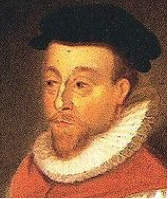 Orlando Gibbons was an English writer and musician who lived during the late Tudor and early Jacobean periods. He was an accomplished keyboard player, specialising in the virginal and organ, and he established himself as England’s leading polyphonic composer during the early part of the 17th century.
Orlando Gibbons was an English writer and musician who lived during the late Tudor and early Jacobean periods. He was an accomplished keyboard player, specialising in the virginal and organ, and he established himself as England’s leading polyphonic composer during the early part of the 17th century.
He was born in December 1583 in Oxford and his father, William, was one of the town’s official musicians known as “waits”. Orlando studied at Cambridge university, but was only able to do as a “sizar”, meaning that much of the costs of his tuition, accommodation and meals would be paid for by the university. He may have had to work a certain number of hours to compensate for this “grant”. He was a member of the choir at Kings College, singing with them for two years from 1596, and he was occasionally paid for music that was written for special occasions. He gained his Bachelor’s degree in music in 1606.
His musical talent was recognised by King James I when he was appointed as an organist in the exclusive group of musicians known as the Chapel Royal, a body whose performance responsibilities were exclusively to the king. Gibbons filled this role from around 1615 and remained in it until he died, becoming senior organist in 1623. All this time though he was a prolific composer, mostly of religious pieces such as madrigals and verse anthems along with a good number of fantasias for the keyboard. One of his best known madrigals in The Silver Swan and it is reproduced here:

Verse anthems composed by Gibbons were usually of a fairly complicated nature. A good example was This is the record of John, a piece that requires alternation of voices using full choir, tenor and countertenor at different points. Similarly, he produced highly complex pieces of music for the keyboard, showing that he had full command of the three- and four-part counterpoint method.
Gibbons lived a fairly short life so perhaps his music was more appreciated after he had died. In fact, not much of his work was published during his lifetime. The 20th century Canadian pianist Glenn Gould, for example, described him as his favourite composer and even compared the work of Gibbons to that of Anton Weber and Beethoven. He was deeply moved by it.
Orlando Gibbons was such a highly regarded musician that he was appointed as principal organist at Westminster Abbey and he played the music at the funeral of King James I. He had a close connection with Charles I as well and it was while accompanying the king back to London from Dover that Gibbons died suddenly, in 1625. The cause of death was recorded as apoplexy but there was some connection to the plague that was ravaging England at the time. Doctors thought it necessary to open up his skull during a post mortem and the following quote from the report explains the verdict:

Orlando Gibbons died on the 5th June 1625 and was buried at Canterbury Cathedral.

